翻译培训 名词性从句的译法
- 格式:ppt
- 大小:181.50 KB
- 文档页数:37
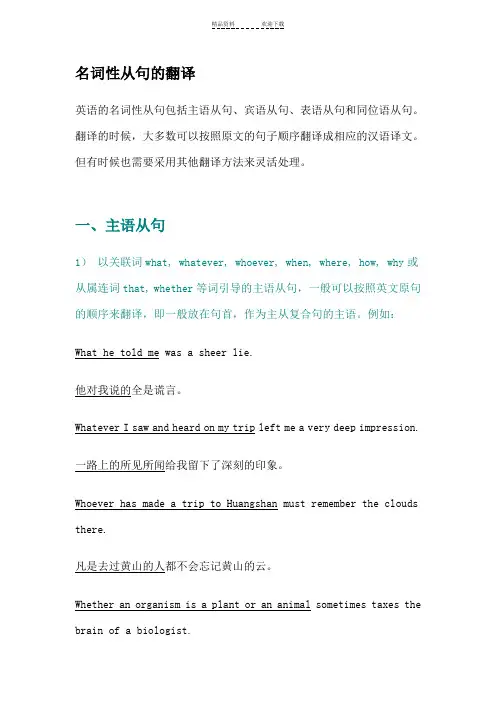
名词性从句的翻译英语的名词性从句包括主语从句、宾语从句、表语从句和同位语从句。
翻译的时候,大多数可以按照原文的句子顺序翻译成相应的汉语译文。
但有时候也需要采用其他翻译方法来灵活处理。
一、主语从句1)以关联词what, whatever, whoever, when, where, how, why或从属连词that, whether等词引导的主语从句,一般可以按照英文原句的顺序来翻译,即一般放在句首,作为主从复合句的主语。
例如:What he told me was a sheer lie.他对我说的全是谎言。
Whatever I saw and heard on my trip left me a very deep impression.一路上的所见所闻给我留下了深刻的印象。
Whoever has made a trip to Huangshan must remember the clouds there.凡是去过黄山的人都不会忘记黄山的云。
Whether an organism is a plant or an animal sometimes taxes the brain of a biologist.一种生物究竟是植物还是动物,有时会让生物学家颇伤脑筋。
2) 对于it作形式主语的主语从句,可以先译主句,顺译为无人称句。
有时也可先译从句,再译主句,这样的话,一般需要在主句前加译“这”。
需要注意的是,如果强调it,可以将其译出;如果不需要强调,也可不译。
例如:It is strange that she should have failed to see her own shortcomings.真奇怪,她竟然看不出自己的缺点。
It seemed incredible that she should have lied to us.她居然对我们说谎,这真是不可思议。
It doesn’t make much difference to me whether you come or not.你来不来我不在乎。
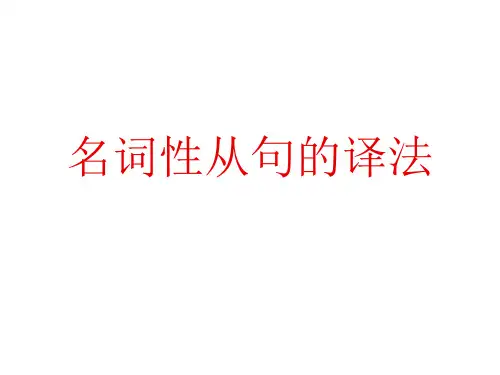
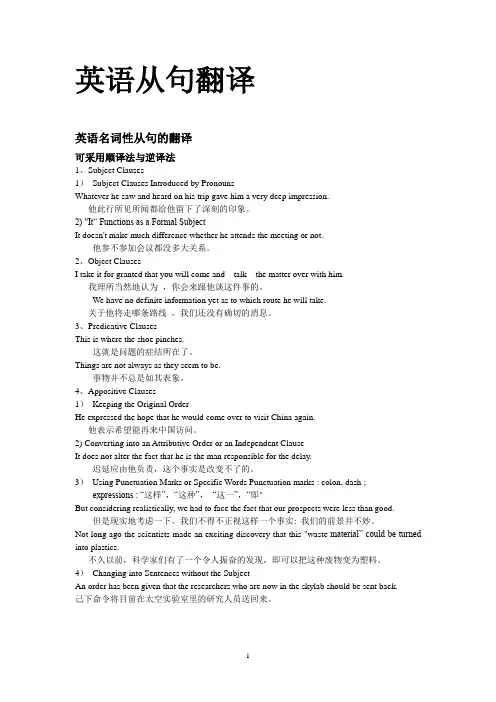
英语从句翻译英语名词性从句的翻译可采用顺译法与逆译法1、Subject Clauses1)Subject Clauses Introduced by PronounsWhatever he saw and heard on his trip gave him a very deep impression.他此行所见所闻都给他留下了深刻的印象。
2) "It“ Functions as a Formal SubjectIt doesn't make much difference whether he attends the meeting or not.他参不参加会议都没多大关系。
2、Object ClausesI take it for granted that you will come and talk the matter over with him.我理所当然地认为,你会来跟他谈这件事的。
We have no definite information yet as to which route he will take.关于他将走哪条路线,我们还没有确切的消息。
3、Predicative ClausesThis is where the shoe pinches.这就是问题的症结所在了。
Things are not always as they seem to be.事物并不总是如其表象。
4、Appositive Clauses1)Keeping the Original OrderHe expressed the hope that he would come over to visit China again.他表示希望能再来中国访问。
2) Converting into an Attributive Order or an Independent ClauseIt does not alter the fact that he is the man responsible for the delay.迟延应由他负责,这个事实是改变不了的。
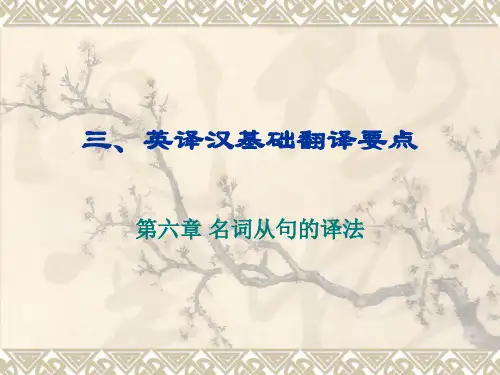

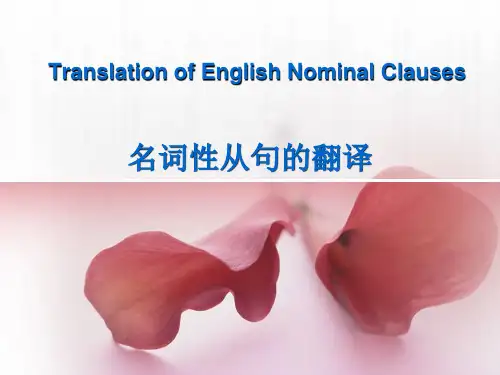
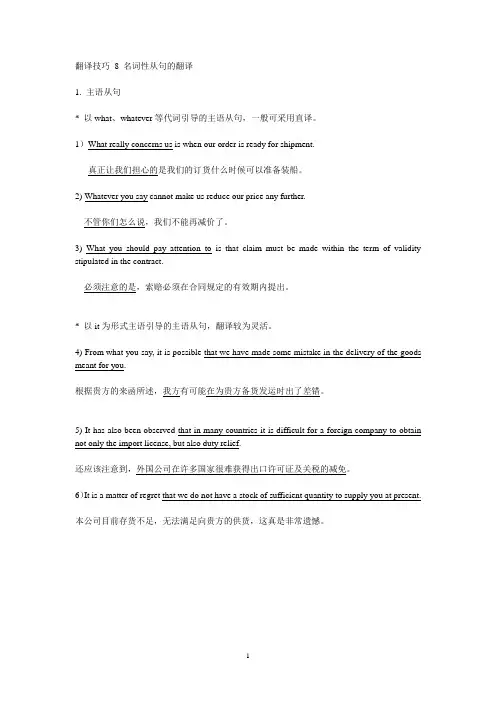
翻译技巧8 名词性从句的翻译1. 主语从句* 以what、whatever等代词引导的主语从句,一般可采用直译。
1)What really concerns us is when our order is ready for shipment.真正让我们担心的是我们的订货什么时候可以准备装船。
2) Whatever you say cannot make us reduce our price any further.不管你们怎么说,我们不能再减价了。
3) What you should pay attention to is that claim must be made within the term of validity stipulated in the contract.必须注意的是,索赔必须在合同规定的有效期内提出。
* 以it为形式主语引导的主语从句,翻译较为灵活。
4) From what you say, it is possible that we have made some mistake in the delivery of the goods meant for you.根据贵方的来函所述,我方有可能在为贵方备货发运时出了差错。
5) It has also been observed that in many countries it is difficult for a foreign company to obtain not only the import license, but also duty relief.还应该注意到,外国公司在许多国家很难获得出口许可证及关税的减免。
6)It is a matter of regret that we do not have a stock of sufficient quantity to supply you at present.本公司目前存货不足,无法满足向贵方的供货,这真是非常遗憾。
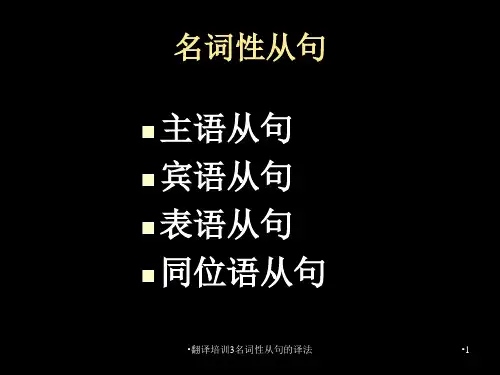


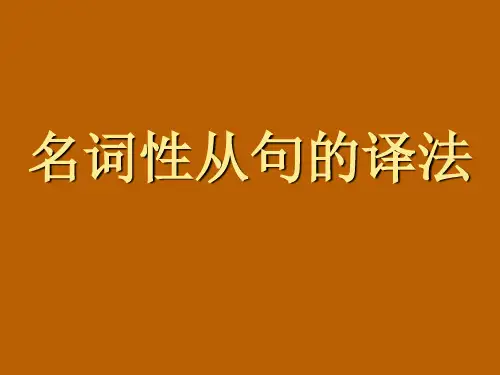
名词性从句的翻译技巧主语从句1.用what, whatever, whoever, when ,whether, where, why, how 等来引导主语从句,按照原句的顺序来翻译。
一路上所见所闻给我留下了十分深刻的印象。
他来不来都没关系。
任何值得做的事情都应该做好。
What I saw and heard on my trip left me a very deep impression.Whether he comes or not makes no difference.Whatever is worth doing should be done well.2.用it作形式主语来翻译A. “It +谓语(表语)+that / whether…”句型你来不来参加会议我不在乎。
她居然对我们说谎,这真是不可思议。
It doesn’t make much difference to me whether you attend the meeting or not.It seemed incredible that she should have lied to us.B. “It+被动语态+that”句型这种句子在汉语里常常是主动句,含有“大家”“我们”“有人”“人们”等泛指性的主语,或是以“据……”开头。
据报道,这个会议将在12月举行。
众所周知,职业体育运动在美国非常普及。
It is reported that the conference will be held in December.It is well known that professional sports are popular in the United States.宾语从句1) 以that, what, how等引导的宾语从句,一般按原句顺序翻译。
我告诉他我不得不拒绝他。
你没听见我的话吗?我告诉他,这个机会对我有着多么大的吸引力。
考研英语每日一课(英译汉——名词性从句的译法)英译汉——名词性从句的译法英语名词性从句包括主语从句,宾语从句, 表语从句和同位语从句, 在翻译这类从句时, 大多数可以按照原文的句序翻译成相应的汉语,但是也有一些具体的处理方法,下面我们结合一些实例加以说明:例1.How andwhenhuman lang uagedevel opedand w hethe r ani malssuchasch impan zeesand g orill as ca n dev elopa mor e ela borat e sys tem o f com munic ation areissue s atprese nt be ing r esear ched, butas ye t lit tle u nders tood.人类的语言是如何发展起来的, 是什么时候形成的, 诸如黑猩猩和大猩猩一类的动物是否会形成一种更加复杂的交流系统,都是现阶段人们研究的课题, 但对此人们都知之甚少。
(主语从句)例2.How w ell t he pr edict ion w ill b e val idate d bylater perf orman ce de pends upon theamoun t, re liabi lity, andappro priat eness of t he in forma tionusedand o n the skil l andwisd om wi th wh ich i t isinter prete d. (95年考题)这些预测能在多大程度上被后来的成绩所证实取决于所使用的信息的量、可靠性和适合程度,并取决于对信息作出解释的技能和智慧。